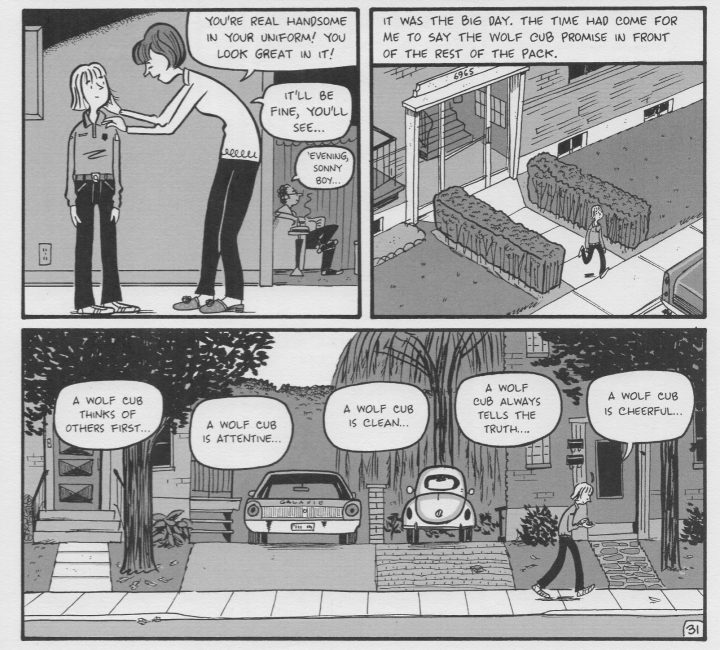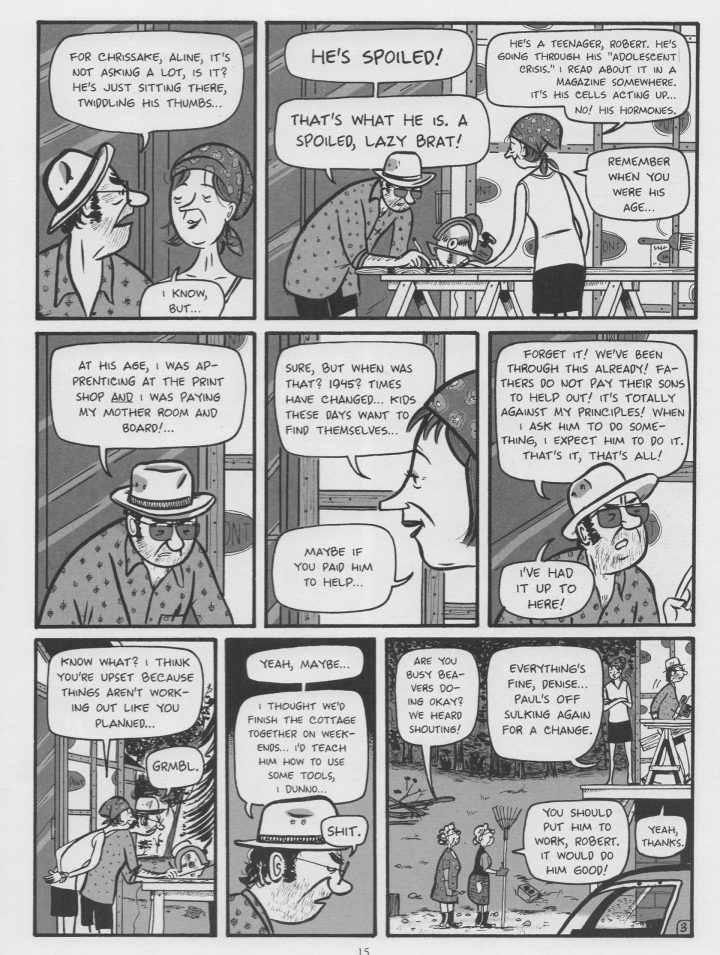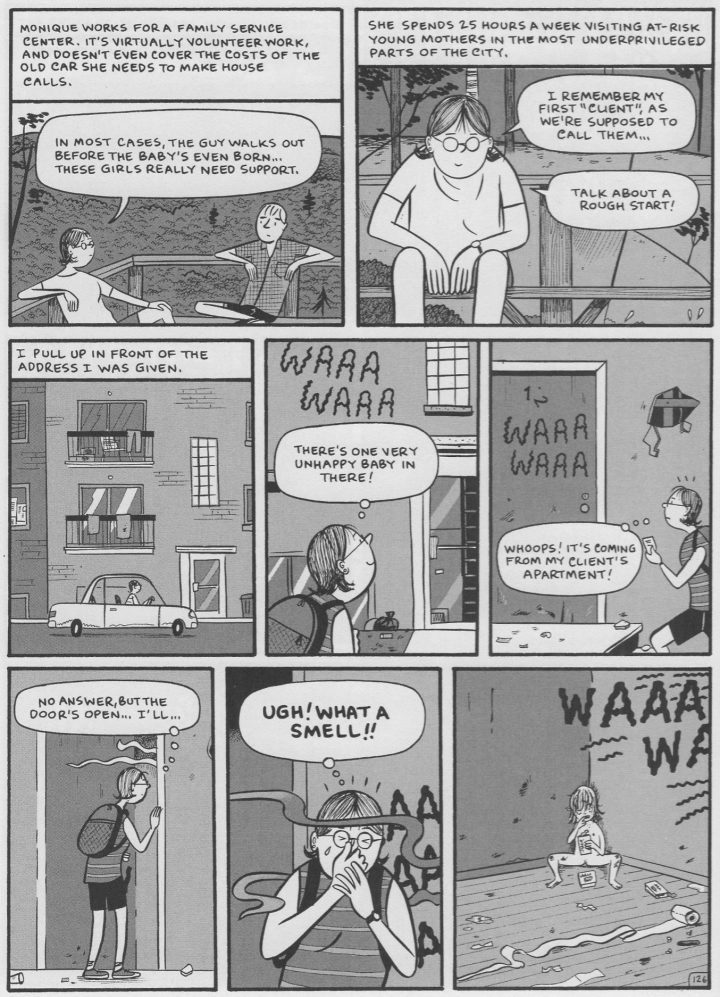
Michel Rabagliati is something of an outlier in the field of North American comics thanks to his twenty years in the making ‘Paul’ series of graphic novels and stories. He’s created a comics ‘bildungsroman’, those novels of formation, following the path to maturity. It’s a lesser-used genre in comics, though Peter Bagge’s Buddy Bradley might fit the category too, as we see Bagge’s alter-ego grow from disaffected suburban teen in The Bradleys (1986) to a middle-aged dad and business owner in Buddy Buys a Dump (2013). There’s growth, life lessons, losses and laughs. Tonally however, Paul has been on a very different journey than Buddy’s sardonic stumble to manhood. Meticulous settings, a sincere tone and family values are the ties that bind in Rabagliati’s comics. With Paul, we’ve been given a very delightful anomaly.
The young Michel Rabagliati grew up on a very different comics diet than many of his North American contemporaries. Rather than 60s Americana or Silver Age comics, he read Franco-Belgian kid’s fare such Asterix, Tin Tin and Spirou and geeked out on Robert LaPalme’s political caricatures. It makes sense that the author is more at home at Angoulême than San Diego; Rabagliati’s work sits comfortably along with more international contemporaries like fellow French Canadian, Guy Delisle or Spain’s Paco Roca.
In his native Montreal, Rabagliati is kind of a big deal. Great book sales, a film adaptation (Paul à Québec), and Rabagliati is seen on TV, while his artwork and murals are found gracing public spaces. Granted, Rabagliati does win both praise and prizes in North America, but some Paul books are yet to be translated into English and his short stories have never been collected. Something is amiss.

Maybe it’s a marketing issue, but the Paul series is something unique and I think there’s a wider audience this work could speak too. My years working in public libraries taught me that there are many adult readers who’d like to ‘give graphic novels a go’ but don’t know where to start. Often when they do jump in they often find something too sexy, weird, violent etc. I love both Alan Moore and Ulli Lust, but they’re not going to be my first recommendation to my daughter’s ‘comics-curious’ English teacher. But with ‘Paul’, your average library patron is safe territory. These books are both charmingly vanilla and truly excellent! And while tiy can pick up an individual ‘Paul’ novel and enjoy it on its own merits, its when the books are read sequentially that the quiet power of Rabagliati’s storytelling really wins you over.
Put simply, ‘Paul’ as a whole is greater than the sum of its parts, and this is especially true when we reach the final book of the series. As a standalone novel, Paul at Home (2020) is a somber read. You won’t find the feel-good beats that characterized the earlier books. However, when backlit by the previous titles, the story and it’s visual metaphors take on deeper, heart-expanding luminescence. My advice to anyone new to Rabagliati is to start backwards and read in order, you won’t be sorry. But more on that later.

For now let’s look at the ‘parts’. Each book contains its own circular narrative, and we actually meet Paul as a youngster in a number of stories. The main childhood book is Paul Joins the Scouts (2013), but we will have already met this kid in the short stories Paul Apprentice Typographer (1999), Paul in the Country (2000) and Paul in the Metro (2001). A feature of these stories is that you see Paul’s supporting cast again and again as our hero navigates his different life stages. Characters and places reappear and recede, existing in their own right and in memory. Rabagliati often seems to be subtly inviting the reader to pay attention, to remember these people and details themselves as he imbues each individual book with this cumulative backstory.
Each book is organized around a time in Paul’s life, usually a transition stage. Whether it’s leaving home, starting a new job, or a family member being born or dying, life is always happening. Paul often narrates his inner world to the reader in first person, but Rabagliati doesn’t stick to that as a hard and fast rule. We get a third person lens with Paul’s family so can he reveal conversations to the reader that Paul wouldn’t be privy to. It deepens our understanding of Paul and whilst it’s a tricky narrative choice to pull off, it feels seamless here. The family connection is strong and these characters own storylines operate like tributaries in Paul’s main story. More than background characters, Paul’s family is at the heart of all this work.

Central to the family are Paul’s parents, Aline and Robert. When we meet them in Paul in the Country (2000), they’ve already divorced. Paul and his partner Lucie take their young daughter to visit Robert and his second wife, while Aline shows up only in memory as a young housewife. His parents separation won’t be detailed until Paul at Home (2020). Twenty years of Paul stories in between will depict the ‘good’ years in-between, with all the inevitable lows and struggles.
The ups and downs of life seem to be the point. Tom Cruise’s sorrows or celebrity weddings are less interesting than the lives of Paul’s in-laws, Rabagliati tells us. Ordinary life is the thing here, and life’s pleasures go hand in hand with the pain. There are many deaths in this series: dear aunt Janette is the first to go in Paul Moves Out (2005), while Paul Joins the Scouts (2013) turns out to be an elegy for Paul’s lost coevals. Neighbors, in-laws and his mom will all meet their end in the pages. His partner Lucie will miscarry twice. Death may be waiting backstage, but life also stakes its claim, and we get many near misses. A broken bone keeps Paul from a fatal road trip; a scary boating mishap with his dad thankfully makes it to shore. Kind strangers save him from freezing in the snow in Paul up North (2016), and a child is plucked from the rapids in Paul Has a Summer Job (2003).

Though formal religion raises its head only briefly, there are spiritual undertones. A prayer is answered in Paul Goes Fishing (2008), and thanks are duly given, but overall the books have a faintly agnostic aura. If there is a Jesus, he’s an imagined fraternal pal and if God does exist, he walks among the pots and pans. Rabagliati offers no big answers; his cosmology is one of gentle humanness and awe at the cosmic mystery. The night sky, the memorizing of stars, Antoine de Saint-Exupery’s story The Little Prince all form recurring motifs. In the final book, a divorced and disheveled Paul watches the Mars Rover crawl its way across on neighboring plant on his mom’s TV set. Is there something out there bigger than us? Let’s hope so. It scares Paul to think that we’re just simply alone in the universe.
The only constant in life is change and as the characters evolve in this series, so does the material world around them. Rabgliati gives close attention to the politics and visual look of each era his characters grow through. Montreal landmarks look large over the series and Rabagliati gives us a history of his home. From Paul’s grade school memories of the 1967 Montreal Expo, to the political landscape of Quebec and the separatist movement during his boy-scout years. Young manhood looms as Montreal Summer Olympics are on the horizon in 1975. The city is always changing, and the lakes and rural parts of Quebec that Paul loves so much will be eroded by development. But even as they change, they won’t completely give up their magic. Always keen-eyed, Paul is constantly assessing his visual landscape to the tiniest detail.

So Paul is trying to finding himself amid these cultural changes. We don’t get much navel gazing though, rather he tends to find his identity within a group. Paul’s quick to join things – scouts, school art troupes, his band of ‘funny, smart, sensitive and cynical’ guy friends. Being amongst a camp counselor, surrounded by teammates in Paul Has a Summer Job will give him a book full of happy memories. Later his life partner Lucie’s will gift Paul a whole new family to fit into and Rabagliati devotes countless pages to Paul’s in-laws. The group is a comfortable place from which Paul can explore life.
But maybe confronting his own individuality is harder for him? Paul submerges himself in his first love relationship with Linda for example, getting well and truly lost. It’s a harsh lesson that ends in heartbreak. Later too, when Paul is truly alone and divorced, he doesn’t fare so well. Isolation seems a little too close to alienation in Paul’s world (and sadly, this is where Paul will end up in the final book).
But, back to the good years! Coupledom and family building are front and center in Paul Moves Out and Paul Goes Fishing. The latter is a multilayered story that shows Paul on vacation, in a lakeside cottage with his extended family. It’s a complex narrative, weaving stories of dislocation, loss and alienation into the family nest. We get to meet Lucie’s sister Monique and a glimpse of the city’s underbelly through her job as a social worker. This narrative meander takes us deeper into the family dynamic and gives fullness to Rabagliati’s ongoing portrait of Quebec. In this book, Paul recounts own difficult teenage episode and now reconsiders his own parents back then, struggling to parent him. This is backdrop to the first of multiple miscarriages he and Lucie will experience. Paul is learning how to be a father, even as it seems that parenthood might not happen for them.

The extended family (Lucie’s family) is at the core of The Song of Roland (2012). Paul, Lucie and young daughter Rose are enjoying the good years; they’ve found their home complete with a bountiful apple tree in the back yard. As they fix up this house Lucie discovers that her dad, Roland, has terminal prostate cancer. The core of the book is the story of his palliative care and death happening in the midst of life-building. In Ingmar Bergman’s 1972 film, Cries and Whispers, there's a portrait of a family struggling to hold space for a dying relative and a similar message seems to ripple through here: perhaps the dying is worse than the death itself. Maybe there is nothing to fear after all?
Roland is Paul’s father-in-law, not his actual parent, and this is just the right amount of familial distance that enables Rabagliati to tell this story so aptly. It’s not a Paul story per se; but a story about family. Later in Paul at Home Paul’s’ mom Aline will also die but Rabagliati’s depiction of her passing is choked and brief: understandably so.

So it’s through Roland that Paul considers death, and Roland is not the most likable guy at the outset. We’ve met him in previous stories, as a terse Orson Welles type in Paul Moves Out and an angry overbearing patriarch in Paul Goes Fishing. Only in his titular book do we see the fullness this man. Roland narrates his devastating childhood, rife with sexual abuse, abandonment and addiction. The boastful self-congratulatory knick-knacks on the wall proclaiming Roland a ‘self-made man’ don’t even begin to capture it. From ornery and ordinary, as Roland’s loving nature shines through the reading of this story becomes an exercise in empathy.
We realize that Lucie, who was “obviously well brought up” (Aline’s words), is just a generation away from a very different kind of life, one of abject poverty and trauma. We now get to consider her sister Monique’s vocation in a new light. She is a daughter of Roland, immersing herself back in the world her father climbed out of, trying to help and to mend others and not always successfully. We realize that Rabagliati is doing something remarkable as a storyteller here, over his many books. It means something to the reader that Roland climbed out of a living hell to make a good life for himself, but now we have to see him die. It sounds like a depressing read for sure. It's not. Everyone should read ‘The Song of Roland’ and I’ve loaned my copy out multiple times. Death is inevitable, but when it comes for Roland, his loved ones surround him and there’s no pain. He doesn’t have to meet the grim reaper; he’d rather slip away. There are moments of radiance, love and also potty humor. And maybe Reality with a big R gets a look in as well.

Rabagliati raises the possibility of an afterlife at this books closing. A ghostly glimpse of a smiling, ascending Roland, still in pajamas, is given to Paul’s daughter Rose, before the reader is pulled away. Rabagliati has us zoom out. Where has Roland gone? We can’t know. Instead we’re invited to look at how small it all is, from a great height, with life, death and everything else in between.
Which brings us to the final and most difficult book in the series, Paul at Home (2020). Paul's pessimism and frustrations with life are not sugarcoated in this story. The tender and gentle optimism of the earlier books has evaporated. Paul is divorced from Lucie, his mother Aline is battling terminal cancer, and his now grown-up daughter Rose is moving to England. Everything is dying, decaying or moving away. This book piles on Paul’s troubles and to a first time reader of Rabagliati’s work, this book may seem impossibly depressing and I hate to say it but the metaphor of the dying apple tree may seem a bit trite.
But stay with it. A longtime reader of Paul has a connection with that apple tree. It came with the house and was a symbol of life in full bloom. Alone in that same house now, neither Paul nor the tree, are looking so hot! He walks around like a slob, ignores his broken tooth, and boasts a long list of physical complaints. Paul’s stagnant, just like the water in his swimming pool and he medicates his psyche with sleeping pills, anti-depressants and anxiety meds. Middle age is no picnic and it seems like Paul is slamming into his unresolved issues of identity.

His divorce from Lucie is visually juxtaposed with his mother’s death and it’s a hard-hitting scene. The vibrant extended family that once enveloped Paul through his connection to Lucie seems lost to him now and Paul doesn’t handle isolation well at all (never did, perhaps?) It’s a sad book, full of frustration, grief and making adjustments.
Despite the story being the unhappiest of the series, the artwork sees Rabagliati at the height of his powers. Rabagliati has never drawn Montreal quite so triumphantly as he does in this volume. As Paul’s spirit is dimming, the artwork shines.
So what is to be done?
Paul tries! He goes to therapy, he signs up for a dating site, he starts jogging. He keeps going, and in many ways is still the boy scout from all those years ago. He’s still thoughtful, attentive and truthful (even if his truth is ‘life sucks right now!’). But Paul in middle age has forgotten how to be cheerful.
Is there’s a path through this mire for Paul? Is this really how the series ends? I don’t know.

Rabagliati flanks Paul with two formidable old guy neighbors and the choice seems meaningful. One’s a mysterious bachelor, ‘mister Stogie’, the other is Tonio a mercurial master-gardener and widower.
These two old men still have considerable energy and gifts to bring to life. One has the gift of music, the other has the gift of nature. Are we to see art and nature as twin balms for the human soul? When Paul’s apple tree is finally cut down, it is Tonio that offers the replacement tree. We’ve been warned to be suspicious when this old man comes bearing gifts but this, we’re told, is a genuine offering. It’s a little cherry tree and Paul’s plants it, providing us with the final images of the book and series.
There is a saying that the meaning of life is to plant trees under whose shade you’ll never get to sit, and that is what we get here; Tonio offers this tree, the fruit of which he’ll likely never get to eat himself. But it’s not too late for Paul, is it? The subtext is that life requires cultivation, but with care and attention Paul may yet get to taste the sweetness to come.
I hope so. I hope that Rabagliati is not quite done yet with this unique and profound gift he’s made to literary comics. This series plumbs emotional depths and truths, always rich with detail and beautifully rendered. That there’s nothing else quite like them is another reason to celebrate Rabagliati’s stories.
So here’s to Paul! I’m raising an imaginary glass of cherry cordial to his good health and longevity! Here’s to the hope of meeting Paul again, in a happier place, in a happier time.






